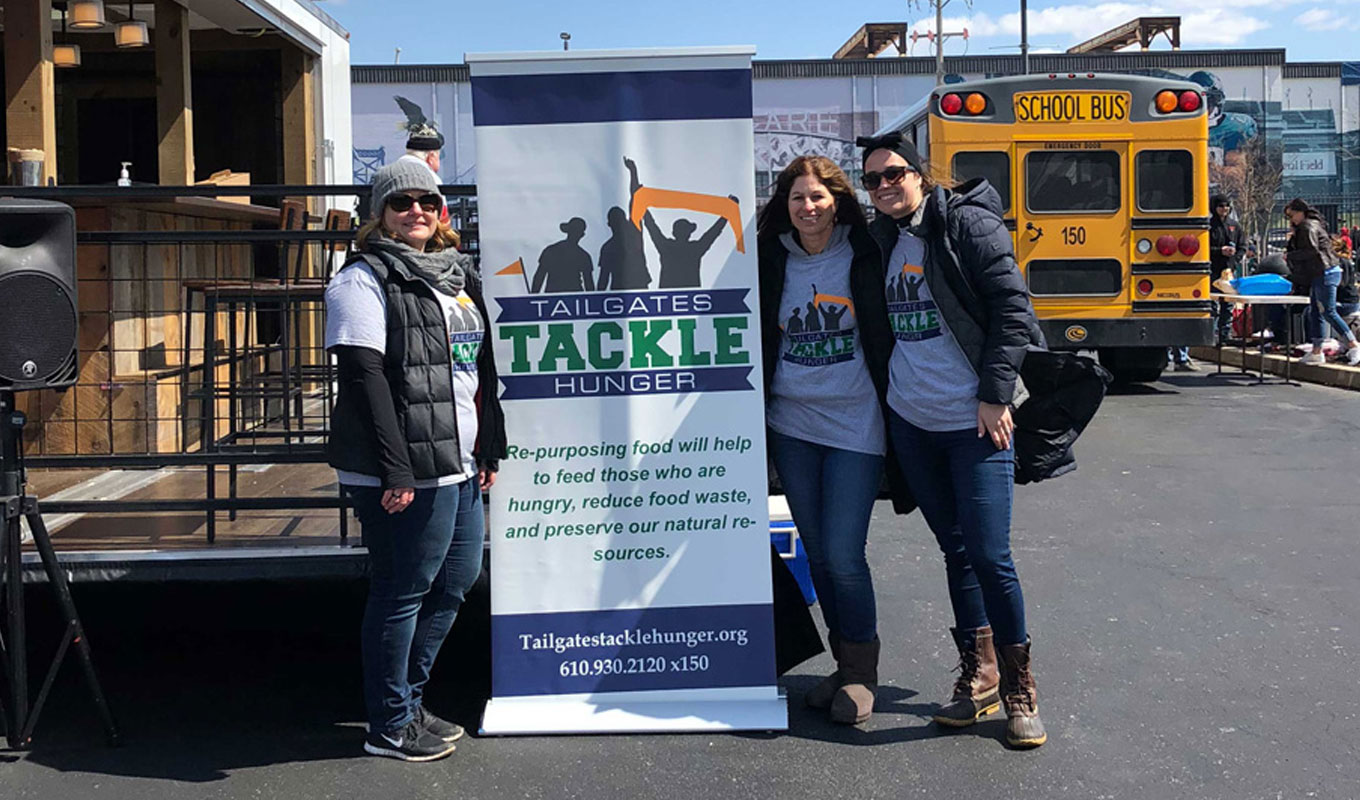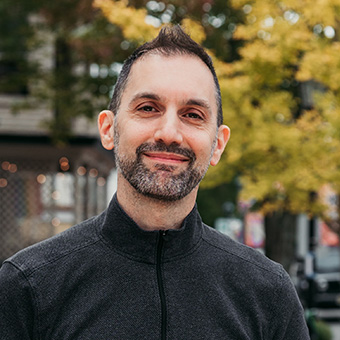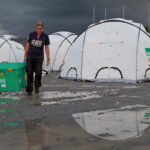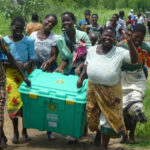
Tailgates Tackle Hunger
Podcast: Play in new window | Download
One fall day at a college football game, Therese Williams’ son realized something so obvious, and so shocking, that their family was spurred to action. As often happens, they had some food left over from their pre-game tailgating party – and so did many of the other tailgaters at the game. Most of this food was prepared on site, and it would end up getting trashed before the game even started. They realized that if you added up all the food left over from all the tailgaters at all the games, the waste would be astronomical. For a problem this big, Therese and colleague Kerri Marin have identified a two-part solution: addressing food insecurity in their community by repurposing the leftovers, and educating tailgaters to prevent food waste in the first place.
LINKS:
Full Transcript
Chris Straigis – 0:02
From AAC Studios, welcome to Scrappy, the podcast about small companies doing big things. I’m your host, Chris Straigis.
Chris Straigis – 0:38
There’s something incredibly communal about sports, or more specifically, being a sports fan. Our favorite teams, whether local or state or national draws together in ways that few other things do. There’s camaraderie and conflict. There’s triumph and tragedy. And we all fully share in these feelings when we’re a fan. This is such a collective exercise, that it’s a natural fit for one of the other communal things we most love – cooking and eating. And when you combine the two, well, there’s nothing like a good old tailgate party. But if you were to add up all the food from all of the tailgates at all of the sports, you’d quickly realized the potential for a big problem. Today, we’re talking with Teresa Williams and Carrie Marin, to women who are raising awareness of the issues related to food waste, and food insecurity in a really novel way by harnessing the power of community around tailgating.
Therese Williams – 1:46
My name is Therese Williams and I am the founder and president of Tailgates Tackle Hunger.
Kerri Marin – 1:53
My name is Kerri Marin. I am the Executive Director for Tailgates Tackle Hunger.
Chris Straigis – 1:59
One of their missions is to get people thinking about what to do after the tailgate – if they do have leftovers, making sure this excess food goes to people in need instead of into the garbage. But Tailgates Tackle Hunger is also committed to educating the tailgating community about smart approaches to preparing food, so that they can actually reduce the potential for food waste in the first place.
Kerri Marin – 2:25
Our mission, and our real purpose is to educate the tailgating community on really just smart approaches to tailgating, what to do before the game to prepare for it, what to do at the game and what to do after the game. It could mean you know, reducing the amount of food that you’re purchasing, that you’re preparing the day of the game, and having a plan for the food afterwards. So I’m either taking it home, and I’m going to reuse it with my own family. Maybe I’m giving it to fellow tailgaters Or I’ve identified a local shelter that I can take it to and donate it. I think our real push is to let the tailgating community know that there are ways to give back and to do something with what you have in excess. And if you don’t want to have excess, how to be smart about not getting excess. I mean what none of us want to have waste. So I think it really starts there on the educational side, and that’s the really the pre planning leading into a tailgate.
Therese Williams – 3:34
I think that’s why when we say Tailgates Tackle Hunger, it’s not just the tailgating event. It’s that that concept of people at tailgates can really lock arms in a lot of ways and do really good things around this whole concept of food insecurity and you know, and waste both.
Chris Straigis – 3:57
Tailgates Tackle Hunger operates mainly in the Philadelphia area. The nonprofit has a particularly big presence at Philadelphia Eagles games were Kerri and her husband are known to bring family and friends by the bus load to their tailgate. And I do mean by the bus load. They actually bought and converted an old school bus into a rolling Eagles themed tailgate headquarters. But the idea behind Tailgates Tackle Hunger actually started from Therese’s own experience tailgating at her son’s football games from the time he was a high school player.
Therese Williams – 4:32
My son was a football player, and all through high school and college. And at the high school level. He was in the local area. And tailgating was a big thing, it was a big program, it was Saint Joe’s Prep. And so it was our week was about tailgating and proceeding the game which was really one of the most important things we felt we were doing for that week. And I have four children. Gary is my only son and three girls. So the three girls were groupies for this, and they were all high schoolers at the time were pre-high schoolers. And so, you know, this was this was our life. But then as we moved into college, and he went to Trinity College up in Hartford, Connecticut, and every weekend we went and we participated in the tailgating events. And of course, the games and all the after celebrations just started to come really clear to us, both of us that there was so much waste going on.
Therese Williams – 5:29
Now, this was a group of people who had a lot of means, and there were big events going on around this tailgating community. So what we used to do and my son would play the game, we’d come back to the tailgate, hang out with friends, and then he and I would start collecting all the leftover foods. And that was the initial push. I’d load up the back of my car and we take it over to the local shelter in Hartford, Connecticut, which is a very need based area. So from there, people started to catch on, and they start to bring it to us. And so much so, by senior year, we would start putting fliers out with a little bit more organization around it, you know, what we can bring, what we couldn’t bring. And by that point, the car was loaded with the leftovers. And it didn’t seem like a big deal. It just seemed like the right thing to do. I came here, when Kerri came here, to Pinnacle Group, and we started talking about it, Kerri has that hospitality background, and I wasn’t short on the ideas for it, I was short on the arms and legs to it. And so with Kerri’s help, and I think encouragement, we formed it as the nonprofit entity that it is today.
Therese Williams – 6:49
And we’ve really created the vision, a clear vision and mission around it. And really started to recognize what we wanted it and thought it could be. And so Kerri who is an avid Eagles tailgater and I am a hanger-oner. Still, because we don’t do it as big anymore, personally, but we just now continue to spread the message. So Kerri has a platform now to really take it forward. And I have the education background to really continue to help build it out.
Chris Straigis – 7:21
The basic purpose has always been about addressing food insecurity, which we can define as a lack of consistent access to enough food for an active, healthy life. A report from the USDA found that in 2018, one-in-nine Americans was food insecure, which is about 37 million people. 11 million of those people are children. And in Montgomery County alone, here just outside of Philadelphia, food insecurity of afflicts an estimated 72,000 people according to data from Feeding America. When I first came across these numbers, I was astounded. The issue of food insecurity in our culture is huge, both nationally and locally. And it’s not just limited to people who have to go without food completely. Just the uncertainty and anxiety about where your next meal is coming from, has major consequences for people. It affects their health, as well as their ability to focus at school and at work.
Kerri Marin – 8:27
Food insecurity is when an individual, their eating or purchasing habits have shifted. So to be hungry, it’s a feeling it’s something that’s physical, your stomach’s growling, you feel tired, you know, you can identify things that you can say it’s because you’re hungry. You don’t have food. Food insecurity is when maybe you’re not eating the way you used to, because of maybe your financial situation. You know, you may you a lighter meal, you may not have a meal, you may skip a meal. That’s food insecurities.
Chris Straigis – 9:07
As a fully fledged nonprofit organization, Tailgates Tackle Hunger is dedicated largely to educating people about these issues. According to their website, 97% of wasted food ends up in landfills. With roughly 50 million people across the country each year tailgating in a stadium parking lot, that can lead to a lot of waste if people aren’t being proactive about what they’re bringing and serving.
Kerri Marin – 9:34
Now, there’s going to be people, I don’t know if I would call it resistance, but people who just, they don’t think about it. As an avid tailgater myself, I’m at every Eagles home game, so I know I’m going to be there. My husband is a culinary instructor, so we both have that hospitality background. So for us, it was all about the big, you know, food in excess because you never want to look like you don’t have enough and, we’ve since changed our own way of thinking because of that, and we’ve started getting smarter and to see them get around the idea of, let’s make sure that we’re not bringing too much how many people do we have coming and really taking tailgates as their own.
Chris Straigis – 10:19
Like food insecurity. The issue of food waste is complex and far reaching and has huge consequences for our society. There’s no easy fix. But there are definitely ways to move the ball in the right direction.
Therese Williams – 10:34
This is something that I think about a lot, and I think was one of the ideas around Tailgates Tackle Hunger. I heard a statistic and it was a visual and it said for every four bags that you fill in a grocery store that you walk out of with, you know, purchasing, you may as well just dropped one of them on the ground because that’s the food you’re going to waste. It’s a 25% model also. So I’ve sort of been keeping that in my brain as well. So now, I mean, this is even affected how I grocery shop, because I’ll go three times a week now, so that I’m not dropping that bag in this in the parking lot. That kind of idea. So, so waste in general, and I think Kerri, there’s a lot you could say about this, in educating the tailgating community – but we’re, you know, we’re parents, we’re family members, we’re in communities – the idea then just transcends life where food is a part of it for yourself and for your families.
Kerri Marin – 11:39
I had pulled up a statistic from Waste Management, and it estimates that four major professional leagues, through the NFL, MLB, NBA and NHL, that they generate approximately 35,000 metric tons of carbon dioxide each year. And that’s just from their fans’ waste activities alone. That’s, that’s huge! Yeah, you don’t think about, okay, so I have waste and I throw it in the trash can. And now that’s going to a landfill somewhere and that’s emitting co2. And when you can reduce waste, obviously there is an impact downstream just by reducing co2, not to mention all of the other benefits that come out of that.
Chris Straigis – 12:25
Both Kerri and Therese recognize that tailgating for most fans is really just about having fun, and they stress that Tailgates Tackle Hunger is not about taking away that fun. It’s actually about empowering fans to be mindful about what they’re bringing along so they can just focus on enjoying their time with family and friends. Because so often, it isn’t really about the food anyway.
Therese Williams – 12:49
I’d like to go back to the favorite tailgating moment, because it had to do with that snowy game. And we were all very festive and and then you know, no one’s snow coming. And it was just like this community that was just together. So this really cool experience. And so the food was the least important part of it. It’s your community. And so that one particular that game was just magical. You know, it just started snowing while you were tailgating. And then it became this crazy big storm.
Kerri Marin – 13:20
Yeah, nine inches of snow that they were not calling for.
Therese Williams – 13:25
So you know, but but it is, It’s the tailgating where you really, you know, feel that excitement.
Kerri Marin – 13:31
I feel very fortunate in the fact that I can go out every Sunday that an Eagles have a home game and I know I’m going to be surrounded by friends and family members, as we like to call them, that I may not otherwise see throughout the week, throughout the month, throughout the year even, it’s like this whole separate consortium of people that I have fun with.
Chris Straigis – 13:57
So how exactly do we as fans to food waste and food insecurity at our own tailgates? Kerri explained to me the idea of the MVP toolkit, which they’ve actually developed as a guide. It’s available for download at their website (https://www.tailgatestacklehunger.org/).
Kerri Marin – 14:12
And it’s broken up into three parts. It’s the pre game – so they’re preparing ahead of time talking to your group – how many people do you have coming? Who’s bringing What? So you don’t have five people bringing 50 hot dogs each. It’s, you know, game day conditions. So even though you’ve planned for X amount of people, and you’re taking that food, are they really showing up, because we all know game conditions is too cold, it’s rainy, you know, it changes people and their ability to get there or participate. So it’s recognizing what we thought we were having 50, now we only have 25. Let’s not cook all 50 hot dogs, so that you’re still being mindful of it during the tailgate and then saying, Well, I have my cooler, I’m going to put them in there. take them home for the next game. So that it doesn’t interrupt, right, the fun. We understand people still want to have fun. That’s what tailgating, you know, that’s what stands behind it leading up to a game you’re getting pumped up. If you do the steps ahead of time, you can still have the fun.
Chris Straigis – 15:14
And that’s not the only techie approach they use to advance the cause. To connect leftover food with those in need of it. Their team primarily uses two apps.
Kerri Marin – 15:24
Food Connect is something that started local, it is an app. And what they can do is they can literally download that app on their phone, they can push a button, it says I have food, they can say what that food is how much of that food they have. They hit a submit button. It works through the algorithms of the app, and it identifies a local agency that can accept that food. The other thing is they also have a pool of volunteers that will actually go and pick up the food at the donor site and deliver it to the recipient or the agency. There’s also food finder which is another app that is nationwide. It is geared toward people who need to find food. So either people that are hungry or people who are food insecure, and you can just put in your zip code, and you can hit enter and it’ll show you all the local pantries and kitchens that are within however mile radius you choose. And it gives you like their contact information hours, if they’re a kitchen when they serve. We use it as a resource for we want to donate food, you know, so then we can look up what’s close to us and we can start making those calls to say, this is the food we have Will you accepted. So it can be used on both sides but really, it’s it’s geared toward people who are looking for food, we just use it as a resource to donate.
Therese Williams – 16:46
Because I think also you know, people are asking us Okay, now that you’ve told me what to do and how to do a better job with this now what do I do with it.
Chris Straigis – 16:54
There are plenty of other steps fans can take to for example, instead of tossing out trays full of subs, or hoagies as they call them here in Philly, plan ahead and bring clear plastic bags so you can take the food into the game with you if stadium rules allow it You can also follow serve safe guidelines as Kerry explains:
Kerri Marin – 17:14
So serve safe is in the hospitality industry anyone who’s serving or preparing food usually you have to be certified or someone on your team has to be certified and it does get very technical in you know what temperatures foods should be kept at and for how long before they become unsafe. And so while it’s it could be very technical, to train on all of it we like people to be aware of the fact that cold foods should be kept cold and hot food should be kept hot for them to remain safe for consumption. And usually the rule of thumb is for four hours so once it’s you know a cold food item that should be kept in served cold, let’s just say potato salad because everybody’s you know worried about mayonnaise and eggs, right? So, you know, we’ll use that if it’s sitting out and it’s a 90 degree day and you’re tailgating and it’s been out for, you know, more than two hours, it’s probably above that safe limits. And it’s once it’s past that safe limit for four hours, it should be discarded. And so why we want to keep access to a minimum, you also have to make sure that you’re not keeping something that’s unsafe. And so that’s part of the prep, the MVP Toolkit, just goes over, you know, don’t put out 10 pounds of potato salad, if only two people are at your tailgate right now. You know, maybe you’re keeping it in the cooler on ice, and you’re only bringing out a small bowl or serving it, you know, right from the cooler for those two people. Because once it becomes unsafe, you can’t, you shouldn’t do anything with it. And so we want to avoid that.
Chris Straigis – 18:56
Because the issue of food insecurity is so widespread the efforts of tailgates tackle hunger are just happening at football games. Carrie and Theresa have spearheaded other efforts to collect food and help raise awareness throughout their community.
Kerri Marin – 19:10
Once a year we hold a food drive right before school is out. So usually the end of May, leading into Memorial Day weekend, because we do recognize that once kids are out of school, they are losing meals that may be provided for them, whether that’s breakfast lunch, and now that school’s out. They’re not, they don’t have access to that. And so pantries do see an increase in need over the summer. So we focus on that at that time of year collecting kid friendly, healthy foods that we can then donate to local agencies who usually have like a kid’s corner Manna on Main is usually our largest benefactor for that event and they have a kid’s corner, and that’s what it’s geared toward, and they do see that uptick. There’s other agencies out there – Disrupt Hunger is one that goes into some of the local schools on Fridays. And they provide not only a meal to the kids, but they also have a table set up with, you know, like pre-packaged items, oatmeal, granola bars applesauce that kids could pack up in a brown bag and take home with them for the weekend. So it’s not even while school is out for the summer. It’s even just that time from Friday when the kid is at, you know, leaving school and they don’t come back until Monday.
Therese Williams –
I can add that my daughter is a school teacher in the Philadelphia system. And one of the things, again, that that happens when you’re exposing the need, as we’ve been able to do through our organization is that then they can apply it in these other settings. So what she was able to do is through Donors Choose which is again another track for getting funding to get support to get a refrigerator, get fresh fruit for her classroom, so that she can help to for the kids because there’s a disadvantaged population. And they’re coming in hungry, you know, she’s always bringing lunch for people and field trips and all kinds of things. So again, maybe it’s an indirect link. But when you start to see more because you’ve been exposed more, you find more ways of addressing the issue. And I think that’s a direct line, I know Tailgates Tackle Hunger has helped to raise awareness around.
Chris Straigis – 21:35
Keenly aware of the potential for a program like this, that Tailgates team also has their eye on the bigger picture. If you look nationally at college and pro soccer, baseball, basketball, and hockey to name a few, there are just incredible opportunities to make a difference. But as anyone in business knows, especially nonprofits, the next steps to expansion are to explore the options of funding. Whether it be from grants or corporate sponsorships or other sources, Therese and Kerri want to expand the reach and awareness of Tailgates Tackle Hunger outside of the Philadelphia area. In the process, they might even be able to do the impossible: Improve the reputation of some of the country’s most passionate fans.
Kerri Marin – 22:19
I’m instantly thinking of how you hear all of these stories on TV and they always highlight the the fans that are you know, heckling, another opposing teams fan who’s in the stadium. And I’ve been a season ticket holder for a long time, you have to Therese. I don’t see that now. And it could be because of me, because of my personality, you know, I think about all of the way fans who come in they’re sitting in our section and we love to find out what drove them there. You know, are they local? How did they become a Redskins fan or a Bears fan? And they have such interesting stories. And I think it would be great if we could take this somewhere else and it’s like, wow, like Philly’s doing something. We’re not throwing snowballs at Santa. You know, we’re not setting cars on fire. This is a tailgating group. Yeah, we’re passionate about our team, but we’re passionate about doing good.
Chris Straigis – 23:29
Thanks so much to both Therese and Kerri for their time. The Tailgates Tackle Hunger crew will actually be at the upcoming Eagles game on Sunday, November 17. So please look out for the big black and green bus and show your support. You can go to scrappypod.com to check out show notes for the Tailgates Tackle Hunger website, the MVP toolkit and some other data sources on food insecurity in the US. If you know someone doing something amazing that you think we should feature on our next season, please fill out the content format scrappypod.com to let us know. Thank you for listening to Scrappy.



